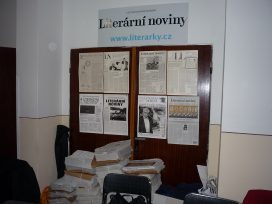The Universal Declaration of Human Rights has been criticised from all sides since its inception sixty years ago. Conor Gearty calls for a fresh definition of this most humanist value.
Articles
Read more than 6000 articles in 35 languages from over 90 cultural journals and associates.
Despite talk of a “unified European plan” to combat recession, the motto among EU member states seems to be “each to his own”. The financial crisis is reimposing the divide between eastern and western Europe, writes Mircea Vasilescu.
Made in Bulgaria
The national as advertising repertoire
Advertising in Bulgaria has always been tied to the national. In the late nineteenth century, it capitalized on the concern about the rapid invasion of western goods; during socialism, advertising took on the role of educator of the new socialist citizen; and since the 1990s, economic patriotism has attached itself to national mythology. Nevertheless, writes Milla Mineva, in Bulgarian political discourse, to talk of the nation means to talk non-politically. Advertising makes visible this depoliticization of the national.

Seeds of spring
A rebellion against censorship
When Ivan Klíma and fellow writers spoke out against censorship in Czechoslovakia at the 1967 Writers’ Congress, the literary weekly Literární noviny was taken out of the hands of the writer’s union and its editorial board dismissed. Yet the seed was sown for the Prague Spring of 1968.
The reaction to the Kundera allegations in the Czech Republic was largely one of doubt. Unlike during the 1990s, when “Cibulka’s lists” prompted a witch-hunt against informers, today the need to lay blame has receded. Miroslav Balastík wonders whether the incident signifies the end of a phase of post-communism in the Czech Republic.
Through the eyes of a zombie
Europe, those who are excluded and the event of being together
Central organizing principles such as “community” have been redefined by globalization, notes Krystian Woznicki. Art faces the question of the representability of community or rather, its unrepresentability. The latter includes the community of the excluded. Referring to photographs by Bruno Serralongue, Woznicki suggests that the excluded are best represented as zombies: they appear as a community that wants to force its way into society. Their goals are unclear.
We need to broaden our political possibilities
Interview with Michael Hardt
“We need alternatives to the thought that our only options are either private or public ownership”, said Michael Hardt when he presented his and Antonio Negri’s forthcoming book “Common Wealth” at the European Social Forum in Malmö in September. The book elaborates on the theories set out in Empire and Multitude, focusing on the common as an alternative to capitalism and socialism.
Jörg Haider was on the brink of a political comeback when he died in a car accident in October. Throughout his career, Haider’s critics in Austria made a disastrous mistake, writes Robert Menasse. They suspected him of fascism, yet didn’t understand it correctly – and therefore couldn’t react adequately.
In the West, manga has become a key part of the cultural accompaniment to economic globalization. No mere side-effect of Japan’s economic power, writes Jean-Marie Bouissou, manga is ideally suited to the cultural obsessions of the early twenty-first century.
While there are many differences between the Kundera case and those of other eastern European intellectuals revealed as having informed to the secret police, its disclosure has followed the usual pattern. It is important to evaluate each on an individual basis, cautions György Dalos.
Art interventions as alternative place-making
Urban cultural exchange between Vienna and Hong Kong
The creative city has become the buzzword on the agenda of many city governments, economic developers, and cultural planners since Charles Landry introduced this idea in his book “The Creative City: A Toolkit for Urban Innovators” in 2000.
A trace of metaphysics?
On the allegations against Milan Kundera
On 13 October, the Czech weekly “Respekt” released details of former police records appearing to prove that in 1950 Milan Kundera denounced a man suspected of spying. Since then, more details of the case have come to light that cast doubt upon Kundera’s involvement. Whatever the outcome, writes Samuel Abrahám, the manner in which the allegations have been made represents a failure of journalistic decency.
In 1997 the circle of right-wing intellectuals from the “Slovenian Spring”, for the most part associated with Nova Revija, signed an appeal called “The hour of European truth for Slovenia”, and considerably later, an initiative called “Something must be done”.
In a text first published in Varlik magazine in 1962, the great Turkish novelist, poet and politician Ahmet Hamdi Tanpinar (1901-1962) addresses what he saw as the demise of the Istanbul of his day. Despite its immediate social critical concerns, the text reflects the author’s existential pre-occupation with time and the unconscious.
In a text first published in Varlik in 1954, the Turkish writer Selahattin Batu sees westernization as both a destructive and progressive force. Striking is how such ambivalence continues in today’s discourse.
“You must create such an interesting national literature that the French will finally begin to feel they are missing something due to their lack of knowledge.” In an article published in 1966, the Turkish poet, journalist and critic Attila Ilhan argued that Turkish literature was far from having gained real recognition abroad. Is the situation different today?